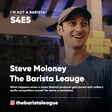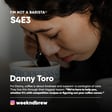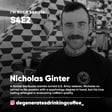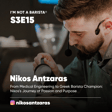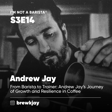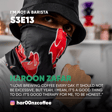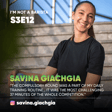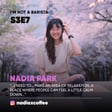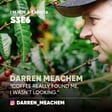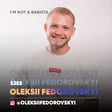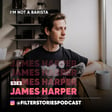Podcast Introduction
00:00:04
Speaker
Hello and welcome to the I'm Not a barista podcast where you can get inspired by real life stories from the people behind the cup. Join us as we talk about everything to do with coffee, from having a career in this industry to brewing tips and how you can support this global community. Humanity runs on coffee and together we can empower the people behind the cup. Hello, everyone.
Benny's Coffee Journey Begins
00:00:29
Speaker
This is Miki, your host of Amna Barista podcast.
00:00:34
Speaker
Some people are coffee lovers, some people are coffee nerds. Denny Marcus is a coffee warrior. He's known as the barista on bike. In 2017, he started a long journey, more than 100 days and 21,000 kilometers. He traveled around India and visited every coffee shop in his network. This tour changed his life more ways than one.
00:00:59
Speaker
Ben is incredibly passionate and motivated guy. He's always keeping himself busy. And his biggest dream is to put India on a map of coffee world. So welcome, Benny. Thank you very much for having me. I'm super excited to know more about your coffee journey. Could you tell us how you started everything?
From Alcohol to Coffee
00:01:19
Speaker
Honestly, I started my coffee journey by mistake.
00:01:24
Speaker
I was a hotel graduate student. I worked in hotels in a few countries and then I got really interested in alcohol. My specialization was whiskey and I got really really interested in whiskey while I was in the U.S. and U.S. and Middle East and also in this country called Azerbaijan.
00:01:51
Speaker
I was really into whiskey. And then I decided to get back home to my home country, which is India. And I come from a state in the west of the country, which is called Gujarat, where alcohol is banned. So you cannot consume or sell alcohol legally.
00:02:13
Speaker
So I was like, OK, I cannot find a job in the alcohol industry. I opened up the newspaper and one of the first jobs I came across was of a coffee trainer from a company that was based out of my home state. Yeah, I mean, we were opening cafes around the country. We had about 120 cafes at that point. And I loved it. But we were selling really cheap coffee. Coffee was not the focus. It was food and snacks and all the other things.
00:02:42
Speaker
Yeah, but then slowly, slowly, there was this one point in 2017, where where I did a trip across the country. And that's when I came to know that, you know, there's something called as good coffee. And I didn't know good coffee existed, you know, so I was like, I should explore this more. I have to ask you, what is good coffee and what is bad coffee?
What Makes Good Coffee?
00:03:05
Speaker
So good coffee and bad coffee. Again, there's a lot of different ways to explain it.
00:03:11
Speaker
Obviously, one of the primary ways is to describe it as whether you like the coffee. If you like the coffee then it's good. If you don't like the coffee, it's bad.
00:03:21
Speaker
But also, a lot of dimensions attached to coffee. So I mean, if you come across a coffee that is sustainably sourced, ethically sourced, there's a lot of care given to the coffee. And every person in the value chain has been paid enough money or the appropriate money, then I would consider that to be good coffee, regardless of the scores. I mean, scores are secondary.
00:03:50
Speaker
Bad coffee is something where, I mean, you do get coffee, which is cheap, but probably most of the people in the value chain are not paid probably or enough. But it is just coffee that is somehow roasted and sold. And most of this time, this does not even taste good. So that to me is bad coffee.
Motorbike Coffee Tour
00:04:13
Speaker
So you started getting to know the real good coffee from your trade. Correct.
00:04:23
Speaker
So back in 2017, my ex-boss, I mean, we had so many cafes across the country and I just one evening we were having some drinks and I asked him, hey, did you ever go and visited all your cafes there once? And he's like, no, I did not do it personally, but that's a great idea.
00:04:47
Speaker
And I was like, can I do that? Like, can I go across and visit every cafe that we have in the country? And at that point, I was also like opening cafes and training people for them. And I said, I'll visit all of these cafes and I'll train them and I'll solve the problems that they have. I'll do everything, but I just want to do it. And he was like, are you sure? And I was like, yeah, but I'll do it on a motorcycle.
00:05:13
Speaker
And I said, you know, I also want to do some research of my own along with this trip. And he was OK with it. And and we still talk about it. And and I was like, oh, it's happening. So then I started planning and then I started this trip. So the idea was to go across the entire country of India and Nepal on my own. So I'm I'm riding solo on a motorcycle.
00:05:37
Speaker
with all my stuff, the computer. Then the idea was to go to all the cafes that the company had, but also to meet a lot of people in all of these places and talk to people about coffee. India is predominantly a tea drinking nation, and that's what we've all grown up with listening to every day. I just wanted to know why is it that we drink a lot of tea and not a lot of coffee.
00:06:06
Speaker
And man, it was an interesting, interesting journey. I mean, there's so many things that I like, so many things that I came across. And also during the strip is when I did my first ever cupping.
First Cupping Experience
00:06:22
Speaker
I did not know what cupping was. I remember there was a cafe in Jaipur. It's called Curious Life Roasters, Curious Life Coffee Roasters.
00:06:34
Speaker
They are hands down the best roasters in the country. And I was just texting them on Instagram that, you know, my name is Barista on bike. I'm traveling on motorcycle and visiting all of these places. And they were very kind enough. And they're like, can you come down to the cafe in the morning before the cafe opens and we can cup some coffees. And I was confused. Like, what do you mean by cup the coffees? Like, don't you drink the coffees? I didn't know what to do.
00:07:03
Speaker
But I did not want her to come across as somebody who did not know anything about coffee, right? Of course, no. So I was like, OK, Shah, I'll come there. I go there in the morning, and there's a gentleman and a lady there. And they're cupping, or they're tasting some Ethiopian, and some Kenyan coffees, and some Indian coffees. And they're slurping. Yeah, it's the cupping sound. And I was so confused. I was like, what am I supposed to do? Am I supposed to do the same thing?
00:07:32
Speaker
And I don't know what to do. I'm so confused and I'm almost embarrassed. And they were like, how do you like this coffee? And I was like, yeah, it's good. It's really good. And it's like, do you get so-and-so notes? And I was like, yeah, yeah, yeah, absolutely. You do get that. I have no idea what they're talking about. But the coffee was good. It is very intimidating, isn't it? It is. For the first time, we were like, what the hell is happening?
00:07:58
Speaker
You know, people are so confused. You know, it's like there's like a whole set up of lab and you're like, wow, this must be some really serious work. You know, so all I remember from that day was, you know, coffee was really good. It was like something that I've never tasted before. And this was like so beautiful, so sweet, so different.
00:08:19
Speaker
I was mesmerized. I was like, wow, this is good coffee. I've never had this. Yeah, that's how I started the journey.
Coffee Myths in India
00:08:26
Speaker
There's a lot of myth about coffee in India. We have this huge divide between the northern side of India and the southern side of India. The southern side of India are comparatively more of a coffee drinker. It's a street style coffee drink.
00:08:46
Speaker
which is made similar to how a Vietnamese coffee is made. You put a very finely ground coffee and you get a decoction of coffee, which is thick. And normally it is bitter. And then you add milk and you add sugar or condensed milk. And that's how people drink in the south of India. So predominantly they use a lot of robusta or they use a lot of chicory, which is like an additive to coffee.
00:09:13
Speaker
But in the north of India, it has always been instant coffee. So if you talk about coffee, people know that, OK, there's this A particular brand of instant coffee, or there's B particular brand of instant coffee. And that is their knowledge of coffee. That is it. Apart from that, they have a lot of myth, like, you know, if you drink coffee, you'll become dark skin. So. So.
00:09:40
Speaker
Well, that's not my first time to hear it. I guess you just need to drink more milk. Oh, man. But when people told this to me, I did not have a good comeback because I'm dark skinned like myself, right? So I did not have anything to convince that, you know, it does not happen like that. You have to be fairer
Barista Profession Misconceptions
00:09:58
Speaker
skinned. So if you drink coffee, you become dark. Or if you drink coffee, it will start affecting your brain. I mean, there's just so many
00:10:05
Speaker
just very stupid myths around coffee. They did not know what a barista is. Everybody thought there is a brand in our country called as Barista, which is like a brand of cafe. My motorcycle had a stamp on it, it still has, which has my logo and it says Barista on Bike, which was my Instagram ID. People thought that I was working for that brand. They did not know Barista is a profession. Every time somebody met me, they're like,
00:10:33
Speaker
What is barista? It's a profession, somebody who makes your coffee. Isn't that a waiter? No, a waiter is different. They did not know that barista was a separate profession, which was very interesting. Each and every of that, a couple of thousand people whom I met during the journey, at least they knew that barista is a profession. There are people who study, who are also educated, and who willingly want to take this as a profession, which was funny, but it was interesting.
00:11:03
Speaker
Did you ever have this idea that you should print a t-shirt and print what is the barista and then answer that barista is profession? I think I really can save you a lot of time. Yeah, but I mean, I think I should have had that in my first trip. That's a great idea. Well, now you know what to do. Print a t-shirt for the next trip.
Black Coffee Confusion in India
00:11:28
Speaker
I'm sure you have learned a lot from your first trip around India. And during this trip, you must meet so many people, heard so many stories. And what is the most interesting story that happened in this journey? Man, a lot of interesting stories, man. Like I normally go to a cafe to probably have a coffee, right? In most of the northern side of coffee, the idea of black coffee does not exist. Like
00:11:57
Speaker
Even if it is instant coffee, if I stay in a hotel and I call up the reception, they cannot have a cup of black coffee. And they'll be asking me, what do you mean? I'm like, black coffee. What is that? How do you make it? I'm like, you use instant coffee, just take hot water, add the powder. And that's it. Yeah, but what is that? I'm like, they don't understand that. So their idea of coffee is hot milk and instant coffee.
00:12:27
Speaker
they have never made black coffee. They do not know what black coffee is. There's a lot of times that I really had to go to people and then ask, can you just give me a glass of hot water? Can you give me a small packet of instant coffee? I'll just make my own coffee. We have a lot of street vendors in India because we have roadside stalls or roadside vendors where they sell tea and coffee. Imagine this, a tea,
00:12:53
Speaker
or a cup that is around a little bigger than your 60 ml shot, about 80 to 90 ml cups. And they make tea, like the chai that we have in India, and they sell it for about 5 to 6 rupees, Indian rupees. The same size of cup, they sell coffee for 15 rupees.
Quality vs Price in Coffee
00:13:15
Speaker
And when I ask the street vendors, why do you charge so much for coffee, they'll be like,
00:13:22
Speaker
Oh, because everybody's charging because making coffee is cheaper. You use like that small instant coffee which costs like one rupee and then you add hot milk and that's it. But it's just that such kind of things have just put in the mindset of the millions of Indians that coffee is supposed to be expensive. On top of it, if you go to like on the other end of the spectrum, if you go to five star hotels or if you go to big hotels,
00:13:50
Speaker
they have really crappy coffee, like really bad coffee, like really, really bad coffee. They use some international brand of coffee that I cannot name. They use the crappiest, the cheapest, the cheapest machine possible. And they make something that looks black, but it's like pathetic. And they charge, you know, like, for example, the street vendor is selling a coffee for 10 to 15 rupees.
00:14:18
Speaker
5-star hotel, if you go, they sell it for 1,000 rupees. That's good business. And it is a really bad coffee, like really, really pathetic coffee. You really have to probably close your nose or like, you know, just not have any taste while you're drinking it. Now, again, what happens is people who spend money to go to these hotels, they drink this and they assume good coffee is supposed to be like this. I guess the situation does only happen in India, but also in other countries.
00:14:48
Speaker
This reminds me my student life. I used to work as a waiter and I am a coffee everyday but I never got a coffee training at all. Even everyday I use those fancy coffee machines.
00:15:05
Speaker
Now I think about it, I was awful barista. That's what sets your standards, right? Like here, if you go to a good bar or a good hotel, I mean, or to a good restaurant, you would expect if you're paying like really high amount of money for it, you would expect like, you know, that's really good quality food. It's a Michelin star food or whatever it is. But when it comes to coffee, people do not, they do not have a base coffee to compare it with, right?
00:15:34
Speaker
Either they have instant coffee or they have really expensive, very bad coffee, and they have to assume that this is what good coffee is. If you open up a nice specialty cafe and you're serving pour overs and V60s and all that kind of thing with really good beans, people come to drink it. I'm like, oh, this does not taste like the coffee in that five-star hotel. This is just a huge, huge confusion. This has been a very, very, very big challenge for us.
00:16:03
Speaker
Nobody wants to invest in Barista. Nobody wants to invest in training of the Baristas. Nobody takes care of the fact that there has to be a Barista or somebody who would know how to use the machine. What's the point of having a Lamorzoco, I don't know, a Linea PB or whatever it is with a malconic peak, and then you keep a guy who does not know anything about coffee. He's not going to make you a good cup of
Investing in Barista Training
00:16:28
Speaker
Exactly. That is why barista are super important in the coffee industry. It doesn't matter how much money you have invested in the machines or into the coffee beans. All the effort will just go become waste. That is why we should invest in baristas. So the easiest thing is to blame it on the guy who is making the coffee or the easiest thing to blame on is like the coffee beans.
00:16:56
Speaker
Because that's the only two things you can put the blame on, right? The machine guy will say the machine is amazing. Obviously, everybody who says the machine will say the machine is good. It's not me, it's them. It is always easy to blame others, to blame the machine, to blame the government. Yeah. And in this case, you know, you can always blame the farmers because they're so far away and you don't know anything about coffee farming or production. Yeah, that's another side of spectrum most people or most consumers do not know about.
00:17:25
Speaker
I believe there are so many things we need to learn as coffee lovers, as coffee professionals.
Inspiration from Neeraj Shiron
00:17:32
Speaker
During your coffee journey, is there any special person or story that you want to mention here? Oh, man. So this is one guy definitely I have to mention, which is Mr. Neeraj Shiron. He is one of the founders and the head roaster for Curious Life Coffee in Jaipur. The way he talks about coffee is beautiful. He has inspired me.
00:17:54
Speaker
beyond everything. It's like I don't bargain with coffee farmers. It does not make sense. They need to make money. It's just a simple sentence, but it is so beautifully said because most people do bargain. And I know it's a very small thing to say, but I mean, this ideology about coffee has inspired me a lot.
00:18:19
Speaker
like in terms of how to take care of coffee, how to learn about coffee. I mean, so many people have explained it beautifully, you know, whether it's James Hoffman or so many people have mentioned it in so many different ways that, you know, coffee goes through so many hands. The moment people realize that, they think of it, you know, oh, wow, this coffee has gone through a long journey.
00:18:45
Speaker
before it has come to this particular cafe or to this place, and then it has come to me in the form of this beverage in a cup. I think that understanding is amazing.
Appreciating Barista Skills
00:18:58
Speaker
The other thing is, every time that I've spoken to people during the journey, even till now, let's say for workshops, I always made sure everybody in the workshop, if it is possible, I made them make a cappuccino.
00:19:15
Speaker
and they can never make a cabbage you know they don't know how to steam milk they don't know how to pull a proper shot espresso and forget the latte art that does not happen they're burning the milk and doing everything and I know that they're going to do this and then make sure that they do is that they spoil the coffee only so that I can tell them you know like so next time you order a cup of coffee say thank you to the barista being a barista seems easy but is hard like that's like a high point
00:19:44
Speaker
Yeah, people don't think like that. I really like your idea, telling people, showing them how difficult it is to make coffee. And of course, when you're drinking a cup of coffee, we should thank baristas who worked so hard to deliver that cup of joy. And also we should appreciate those people that we don't see in a coffee shop, especially coffee farmers, producers who are so far away from us.
00:20:13
Speaker
Back to your story, during your coffee trip, what was the biggest challenge?
Overcoming Financial Challenges
00:20:19
Speaker
I was crossing the border from India to Nepal. I wanted to explore Nepal because I know Nepal has an amazing coffee drinking culture. I'm at the border control of India and Nepal. My company, which was sponsoring the trip,
00:20:41
Speaker
had almost gotten bankrupt. I had about 3,000 rupees in my bank account. And I was supposed to cross the border to go to Nepal. And I'm supposed to pay some fee for my motorcycle and some visa fee for myself. And I have to take care of my lodging and everything in Nepal. I was so confused at the border control, whether I should go, whether I should not go, or should I just pack everything and get back home and forget about the strip.
00:21:11
Speaker
I didn't know what to do. Man, I've come so far, I cannot do this to coffee. I mean, I know it sounds stupid, but I just put it in my pocket and I just crossed the border and I went into Nepal. I think that was one of the best things that I did. Because even with that weird and very scary moment,
00:21:37
Speaker
I stayed in Nepal. I met some amazing people, had some crazy coffees. The town of Kathmandu, which is the capital of Nepal, they have about 800 cafes in that one town, which was mind-boggling to me because India, being such a big country, we do not have a cafe culture like that. And I was so mesmerized.
00:22:03
Speaker
And then from that point in Kathmandu, no matter how, I beg money from people. I borrow money from my parents. I finish up my savings, but I am going to finish the trip. And I did. I mean, I went to every other state, pretty much all the states in the country, except the Northeast. And I tasted coffee. I counted every coffee that I had. It was 110 days journey.
00:22:33
Speaker
And I think my last count was around 568 cups of coffee. So that is like having coffee every day, every day multiple cups in every different city. That experience has always been motivating for me whenever it comes to something with coffee that you know
00:22:53
Speaker
man, if I could think something like that, I mean, I can think a lot of other things. So yeah, that's been my most inspirational point in the journey. It is great that your continued journey didn't stop right there.
Ongoing Coffee Documentary Journey
00:23:05
Speaker
And great job. Could you tell us what happened after that when you were back from your journey?
00:23:10
Speaker
So after that I came back home after 110 days. My parents were happy to see that I was alive and I was okay. So in 2018, the start of 2018, I started my own small school called as the Barista School. We trained in total around 48 students.
00:23:34
Speaker
in that five months. I think we opened around five cafes between those students. It's very productive. And about I think 12 baristas in different countries. Great job. So that was something pretty awesome. Yeah. There's nothing can stop Benny from continuing his journey. Benny today is still travelling around India and helping people to learn more about coffee, training new baristas and help people to open new coffee shops.
00:24:03
Speaker
He's also preparing a new movie about coffee in India. If you want to learn more about Benny's coffee journey and what's happening in his life, how he's helping his coffee community, you can follow him on Instagram barista on bike. You can also check out Benny's tech talk speech on YouTube. Humanity Ransom Coffee. Thank you for listening.
00:24:26
Speaker
Thank you so much for tuning in to the I'm Not a Barista podcast, where people get inspired and connected through coffee stories. If you want to join our community, then please subscribe for future episodes and follow us on our Instagram to get connected. Until next time, keep smiling and most importantly, keep drinking coffee.

